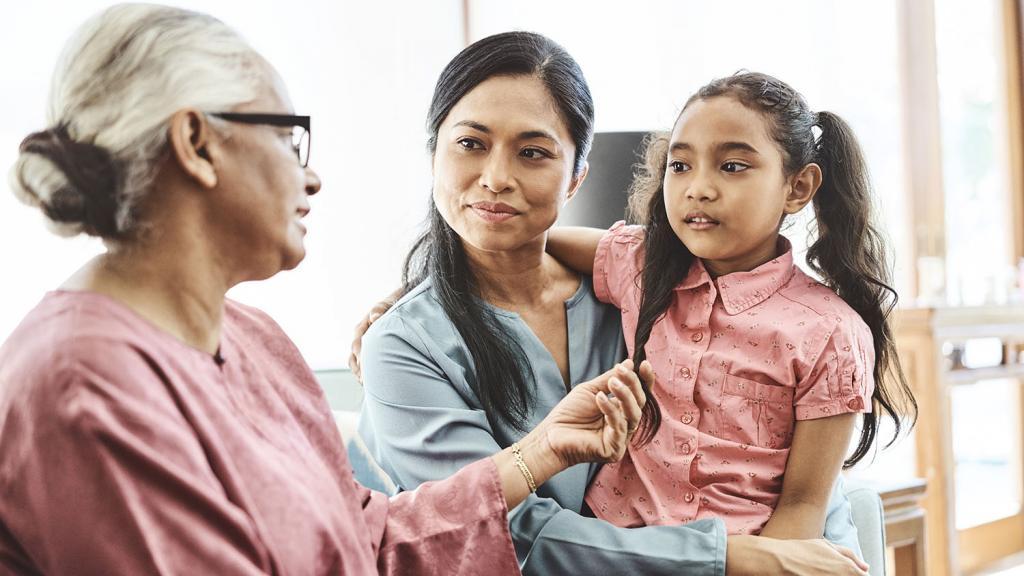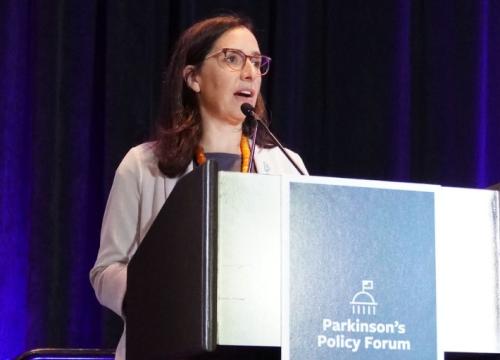Parkinson's Q&A: How do I talk to my children about Parkinson's disease?

Navigating Parkinson’s disease (PD) can feel like a never-ending learning curve. PD Conversations is a place to ask your Parkinson’s questions and connect with others living with the disease. In this blog series, we highlight a high-interest question answered by the Parkinson’s Foundation Helpline on PD Conversations.
Question: My husband is in his 40s and was recently diagnosed with Parkinson’s. We have two young children. How do we talk to them about Parkinson’s? His symptoms are already noticeable, but how do we explain this disease and cope as a family?
Many people diagnosed with young-onset Parkinson’s disease (YOPD) wonder how their children will react to seeing their mom or dad coping with a chronic illness. After all, parenting already has plenty of challenges.
Parkinson's Foundation Helpline
Contact our Helpline at 1-800-4PD-INFO (1-800-473-4636) or Helpline@Parkinson.org for answers to your Parkinson’s questions. Helpline specialists can assist you in English or Spanish, Monday through Friday, 9 a.m. to 7 p.m. ET.
Drawing on the experiences of many PD families, we know children have different feelings about their parent having Parkinson’s disease and these feelings will most likely evolve over time. Children may feel afraid, anxious, worried, ashamed, or sad, and it is nearly impossible to predict how they will feel.
Parents often try to shield their children from experiencing difficult feelings. We know, however, that a better understanding of Parkinson's disease can actually lessen fear and anxiety for children.
In her book, Parkinson’s Disease and Parenting: A practical guide to family life with Parkinson’s disease, Elaine Book, MSW, encourages parents to consider:
- Sharing the diagnosis and the process of diagnosis.
- Providing information about Parkinson’s disease.
- Using language that is understandable to your child.
- Communicating to the best of your ability what might happen.
- Finding ways to allow your child to help and be involved.
- Practicing what you are going to say before talking to your child.
The information you choose to share will likely change as they mature and are able to understand more aspects of Parkinson’s. As a family, you will discover positive ways to share with each other. Try to remember that all parents make mistakes and children are resilient.
In “Parkinson’s and Your Children/Teenagers” we highlight ways you can help children adjust to PD:
- Let your children’s school know, if possible. Sharing accurate PD information with the other adults in their lives will help ensure that your philosophies are communicated in a similar way.
- Establish family meetings. Meet regularly to address issues and worries, along with what is working well.
- Maintain family life. Remain flexible with the changes that occur and encourage your children to continue their favorite activities and hobbies.
- Help your children find peer support. If you are in a Young Onset PD support group, ask other members if they have children and might want to arrange an activity to connect.
- Bring children to a neurology appointment so they can learn about PD.
- Demonstrate a positive attitude. Children learn a lot about coping from their parents.
The good news is that children often adjust well to a loved one’s diagnosis of PD. With support, they not only adjust but also thrive and can become more self-sufficient, confident and independent.
Learn more with the following resources:
- Parent Fact Sheets and Resources
- Parkinson’s and Your Children/Teenagers
- Talking to Children about Parkinson's
- Parkinson's Podcast Episode 43: Parenting and Parkinson's: Raising Children While Living with Parkinson's
Call the Parkinson's Foundation Helpline 1.800.4PD.INFO (1-800-473-4636) for answers to all your questions.
Do you have a question for the PD community? Join PD Conversations in our discussion groups: Young-Onset, Newly Diagnosed, Symptoms, Caregiving and more.
Related Blog Posts

Shaping the Future of Parkinson’s Policy: Meet Our Chief Strategy and Policy Officer

Neuro Talk: Newly Diagnosed
